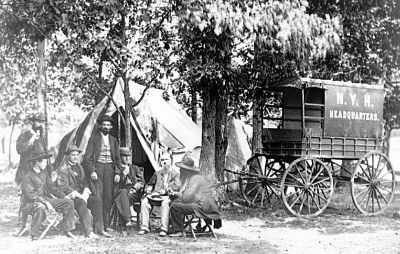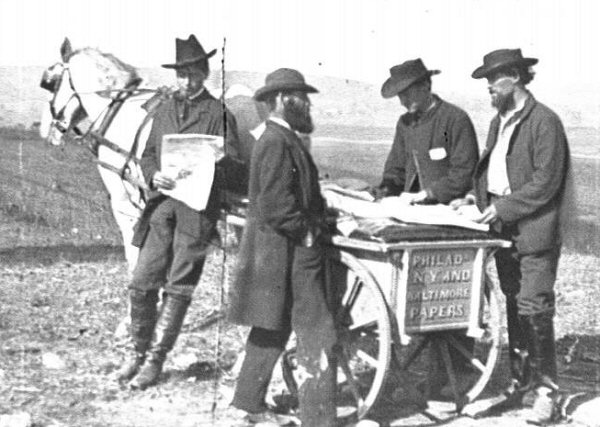History of Journalism in America
Spring
2014 -- Mr Furr
Homework Page

New York Herald Headquarters, Civil War |

Newspaper Wagon, Civil War |
Back to Home Page for this course.
Introductory Remarks
Wikipedia's History
of American Newspapers page gives a brief overview of the subject of this course.
It also illustrates the problem this or any similar course must face:
- Which of the myriad facts, dates, and names should we study?
- What principles of selection should we employ so that we study those "facts, dates,
names" that are most important.
- What hypothesis, question, or theory should we use in order to determine the principle
of "importance" that will allow us to select the very small number of
"facts, dates, and names" to study?
History is the study of change in human society and why change takes place.
- What theory of historical causation should we use to explain the changes in newspaper
journalism -- changes that are still very obviously continuing today?
In this course we will use a "problems" approach to journalism history. What
are the origins of the issues, questions, and problems that exist in contemporary
journalism? How can studying the origins and development of these issues or problems help
us to (a) understand journalism today; (b) understand the history of journalism -- how and
why it has evolved and changed?
Theoretically, we will use
- Michael Schudson's social history approach. Schudson is tentative about causality, but
does present some ideas about why journalism has evolved in this way.
- Ben Bagdikian's economic or business history approach. Bagdikian sees the roots of the
problems in today's journalism as being an inevitable result of the press as a for-profit
business.
These considerations will guarantee that we do not simply "memorize names, dates,
and facts". However, there are a great many fascinating people, events, and -- above
all -- stories -- in the history of journalism in the US. We will take time to appreciate
some of them as well. Stories add "color" -- interest, human drama -- the
essential ingredients of any successful journalism. |
I will post all writing assignments on this page.. You should create a 'bookmark' of
your own to this page, or put it in your 'Favorites' file, so you can go to it without
having to first go to the Home Page for the course.
NOTE: BE SURE TO USE THE PROPER SUBJECT LINE ON ALL YOUR EMAILS
TO ME! SEE BOTTOM OF HOME PAGE
FOR EXAMPLE! |
NOTE: When printing out 'image PDF' documents on Adobe Acrobat Reader,
check the little "Print as Image"towards the top of the "Print" menu.
Remember: if it's not linked, and not in one of our books, it's on our FTP
server.
Be sure to "send a copy to yourself" of ALL
your homework assignments!
IMPORTANT
We cannot have good in-class discussions unless each student has 1. the TEXT we
are discussing that day; and 2. a copy of his/her HW assignment, to refresh your memory
about what you have written.
Therefore, be sure to bring with you to class, every day:
- The TEXT WE ARE DISCUSSING THAT DAY and on which you have written your
HW assignment;
- A PRINTED COPY OF YOUR HW ASSIGNMENT for that day.
If you have either or both of these on a laptop or tablet and bring that to
class, you do not need to print them.
Be sure these items are clearly visible on your desk as I take attendance each
day. I will take note. |
HOMEWORK ASSIGNMENTS
NOTE: You CANNOT print out the readings
for our course on MSU Computer Lab computers! This would tie up the computers and
printers for hours, and consume tens of thousands of pages.
Print out the readings on your own computer. You will need to buy your own paper and ink
cartridges. This is still far less expensive than buying the books.
Assignments on Bagdikian, The New Media Monopoly and The Media Monopoly.
- For Thursday, January 23
- send me two emails, from different email servers. One
of these servers MUST be the MSU 'mail' server. You must set up an email account for
yourself on this server. THIS IS THE EMAIL ADDRESS I WILL SEND ALL EMAIL TO. The second
one is only for emergency use.
- See the full instructions for setting up your MSU mail account on this page.
- Make sure that the Subject line of the email messages conforms to the
model at the bottom of our Home Page.
- THIS IS A REQUIRED ASSIGNMENT. If it is not sent in on time, you
will get an "F" for this assignment.
- Do this assignment - on Bagdikian Chapter 1,
F.A.I.R. 1987.
- For Tuesday, January 28 - on Bagdikian, Chapter 9.
Also, make certain you've done the email assignment for Jan. 23.
- Check out this article: "Olbermann Is
Out" from F.A.I.R., a media watchdog
group. It demonstrates owner's control over the news media and the kind of bias --
pro-employer, conservative -- owners can impose.
- For Thursday, January 30- on Bagdikian, Chapter 11
and old edition, Ch. 7.
- For Tuesday, February 4 - on Bagdikian, Chapter
12 and old edition, Chapter 8.
- Check out this ad by Dr. Brandreth from the Daily Pittsburgh
Gazette September 5 1838: top
part; bottom
part
Please read this page: "Now that we have
completed the first two weeks of the class..."
Assignments on Schudson, Discovering the News, Chs. 1 and 3.
Please note: These are complex chapters. Schudson's organization is
very helpful. To every chapter there is an introductory section; several intermediate
sections; and a concluding section. The main ideas are discussed in the first and last
sections, but the evidence and examples are given mainly in the intermediate ones. Study
the examples -- but make sure you grasp the main ideas.
You may want to do a little further reading about some of the fascinating people and
events discussed in these two chapters. See the links
and suggestions on this page.
For further reading on some of the topics Schudson mentions in Chapter One, see the
following materials (all in our FTP folder): Frederick Hudson, "The New-York
Herald"; "The Herald's Money Articles"; "The Moral War 1840-42".
- For Tuesday, February 11
- For further reading I have put over 20 links to specific newspapers, people, and events
discussed or mentioned by Schudson in Chapter Three on this
links and suggestions page.
- For further reading on some of the topics Schudson mentions in Chapter Three, see the
following materials (all in our FTP folder)::
- Joseph Pulitzer and the New York World, fm Bleyer, Main Currents... (1927).pdf
- William Randolph Hearst and the New York World, fm Bleyer, Main Currents ...
(1927).pdf
Thursday, February
13 - Montclair State University closed because of snow storm. All classes cancelled.
The assignment for Thursday, February 13 is now due
Tuesday, February 18.
If you have already sent it with the date of the 18th, that's fine. You do not
have to email it again.
If you haven't sent it yet, please use the new class / due / date of February 18. |
Assignments on Leonard, Chapter One, and Zenger Trial Materials
Assignments on Leonard, Chapter Two; Isaiah Thomas, Battle of Lexington
- For Tuesday, February 25 Get the text of Thomas'
1775 article from our FTP server.
- See a copy of the
original newspaper here! The story we are reading is on page 3 -- find it beginning in
the first column.
- If you are interested in Isaiah Thomas, download and read Chapter 8 of Frederic Hudson's book Journalism
in the United States from 1690 to 1872 (New York: Harper & Brothers, 1873).
- Take a look at the masthead and
first page of a Revolutionary War issue of Thomas' paper The Massachusetts Spy.
- Read Henry Wadsworth Longfellow's poem "The Midnight Ride of Paul
Revere." Several generations of Americans were taught this poem from the earliest
grades in school as a kind of patriotic propaganda. I think you'll agree that it's very
effective as such! Written as the Civil War approached, threatening to tear the country
apart, and published during the Civil War, it is perhaps as much about the situation in
the 1860s as about the 1770s.
- Here is Ralph Waldo Emerson's famous poem "Concord Hymn", an earlier
patriotic paean about this battle. This is where you will read the words "...the rude
bridge that arched the flood" and the famous lines: "Here once the embattled
farmers stood / and fired the shot heard round the world."
- Here is what Isaiah Thomas himself wrote about his own paper,
the 'Spy', in his pioneering book The History of Printing in America
(1810). These pages are from the second volume, the 1874 edition. Why not take a look?
Assignment on Schudson, Introduction and Ch. 2
Assignment on Schudson, Ch. 4
Assignment on Upton Sinclair, The Brass Check, Chs. 1-9; 35
Optional Midterm Exam (really an extra credit
project) here, due Friday March 28 at 11:59 p.m. by email to me; usual
format.
Assignments on Will Irwin, "The American Newspaper" (1911)
- For Thursday, March 20
- If you want to -- NOT required! -- download the whole series of articles from Collier's,
1911. I have PDF'd the whole series. It's on our FTP server, and is titled "Irwin,
Will, The American Newspaper. Collier's, Ja-Jl 1911.pdf
- .For Tuesday, March 25. Also, please
read, print out, and bring to class, this little classic
on "objectivity." It's fun -- and, true!
Assignments on Regier, Era of the Muckrakers; Knightley, The First
Casualty.
Assignment on Knightley, The First Casualty, Chapter 16
- For Tuesday, April 1. NOTE: This is
a pretty substantial, "meaty" assignment. It has to do with war propaganda, and
is well worth spending the extra time on. That's what I want you to do
Assignments on Seldes, Freedom of the Press; Lundberg, Imperial Hearst.
- For Thursday, April 3
- For Tuesday, April 8 Don't forget to
bring Chapter 11 of Seldes, Freedom of the Press, to class too. We'll spend the
first 15-20 minutes on that before going on to Lundberg / Hearst.
Assignments on Schudson, Chapter 5; Liebling, The Press, selections
Take a look at this interesting historical page
-- front page of the New-York Times for April 14, 1865, reporting end of the
Civil War at Appomattox Court House VA on April 9, 1865. Pass your mouse over it to
enlarge -- it's perfectly readable.
Assignment on Sociology of the Press, Press Analysis.
Assignments on Knightley, The First Casualty
Before doing any of these assignments, review Knightley's Chapter 16, which you read
for the HW of April 1.
Thursday, May 1: This is our last day of class (see the MSU Academic Calendar). We'll
discuss end-of-semester matters. Please attend! There'll be some
important things to talk about, and to do.
http://msuweb.montclair.edu/~furrg/hj/hjhw14.html | Email.Me | Created 20 January 2014



